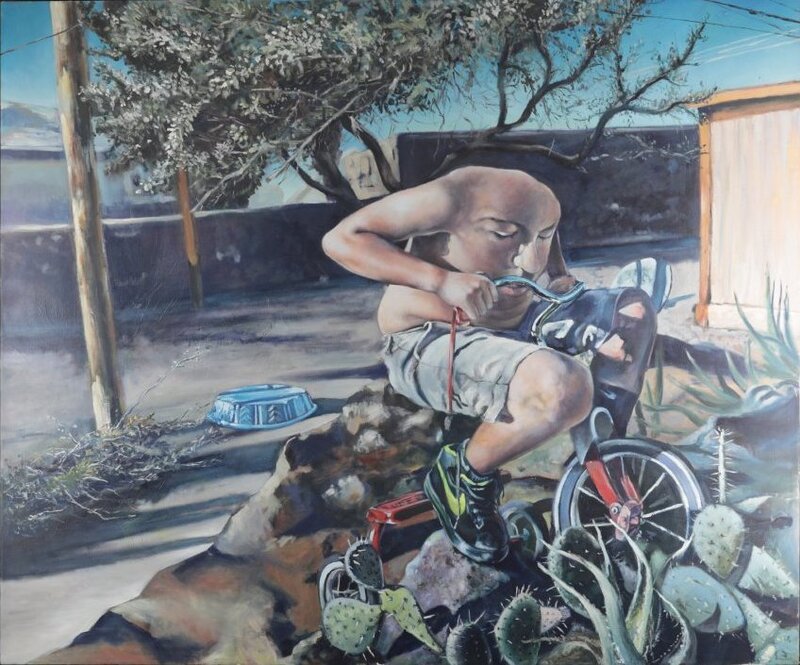Title
Antropofagio: Radio Flyer
Creator
Website
Description
Oil on canvas, 60 in. x 72.5 in. A shirtless boy riding his tricycle through rock and cactus in what looks like a back alley, and behind him lays an upside-down plastic pool. Using Renaissance perspective and chiaroscuro, Francisco Delgado’s painting is a visual metaphor for his life living and working in the borderland of El Paso. Despite the rocks and cacti obstructing his passage, a young man wearing only shorts and Nike shoes plows his Radio Flyer tricycle forward. Oddly, the tricycle rider is headless, and his face is on his stomach. According to the artist, his imagery was inspired by the Brazilian poet Oswald de Andrade’s 1928 Manifesto Antropófago (Anthropophagist Manifesto). Its argument is that colonized countries, such as Brazil, should ingest the culture of the colonizer and digest it in its own way. Delgado refers to this as “cultural cannibalism” to explain how “Chicanos ingest American culture, and we make it our own.” The artist combines this cannibal concept with the Blemmyae, headless human figures with faces on their torsos, as found in Greek and Roman mythology and medieval art. Francisco Delgado was born on November 3, 1974, in Ciudad Juárez, and grew up in El Paso’s Segundo Barrio. He received his Master of Fine Arts from the Yale School of Art. His Bordeño artworks are informed by the social and cultural struggles inherent to life on the Mexican and United States border. His artwork addresses issues of identity, race, cultural traditions, and government policies that affect migration and immigrants. In his own words, Delgado says, “I am a visual artist with an artistic focus on social issues.” He visually represents the history of his community and creates a dialogue for social change. Often using dark humor or satire to depict his narratives, his artwork highlights the struggles of underrepresented people along the border. A prolific artist, Delgado works in painting, drawing, printmaking, and has also produced community murals. His works have been published in books and exhibited in national and international art exhibitions and community institutions. Francisco currently resides, teaches, and creates artwork in El Paso.
Subject
Date
Contributor
Access Rights
Mexic-Arte Museum has created and maintains websites and other digital properties to support its mission to enrich the community through education programs, exhibitions, and interpretations of the collection. These Websites include https://mexic-artemuseum.org/ and https://mexicartemuseum.pastperfectonline.com/. This does not mean that Mexic-Arte Museum owns each component of the compilation, some of which may be owned by others and used with their permission or used in accordance with applicable law (e.g., fair use). Mexic-Arte Museum is committed to protecting the intellectual property rights of visual and performing artists and others who hold copyright. Most items in the collection are protected by copyright and/or related rights. Private study, educational, and non-commercial use of digital images from our websites is permitted, with attribution to the Mexic-Arte Museum. Commercial use of any materials on the Mexic-Arte Museum website is expressly forbidden. Users who wish to obtain permission for publication, display, distribution, or other uses of these materials should contact the rights holder(s).
